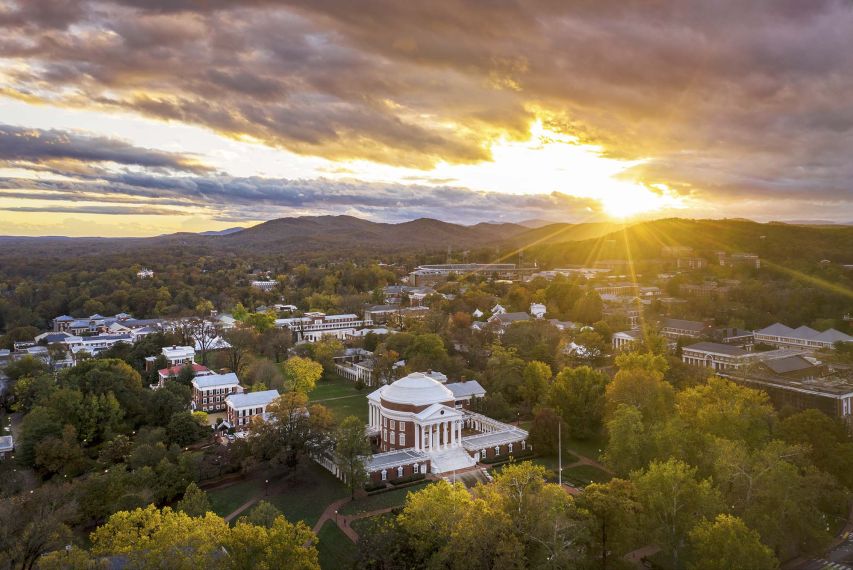The J-term courses offered at the University of Virginia this January provided a unique opportunity for students to engage in global topics, gain new perspectives, and go beyond the classroom virtually.
On offer were more than 100 J-term courses, and many had a global component said Dudley Doane, Director of International Studies, Summer & Special Academic Programs.
“There were more than 6,000 students taking J-term courses and both the faculty and the students reported very positive experiences and a high level of satisfaction from the classes,” Dudley said. In addition to UVA faculty, there were also seven faculty from Valencia, Spain and Lyon, France joining remotely to teach the J-term classes, he added.
Francesca Calamita, assistant professor in Italian co-taught a class called Global Challenges, Local Responses. The 76 students registered in the course learned how societies in Asia, Africa, Middle East and Europe are responding to global challenges like the pandemic, migration, climate change, and gender inequalities.
“While a class like this cannot replace the study abroad experience, yet I hope that it offered an opportunity to discover a bit more about countries and cultures around the world,” said Calamita who co-taught this class with four other faculty members – Chris Colvin, Bilal Humeidan, Charles Laughlin, and Len Schoppa.
Adelaide Brooks who took the J-term course says that it offered that and more. For her, hearing from women from around the world who were close to her age was incredibly powerful. “One of the most fascinating experiences of the J-term was getting to talk to Jordanian women close to my age about their experiences,” she said. “Several young women visited the course, and we had the opportunity to hear from them, in small groups, about how gender norms in the country affect their career choices and personal lives in various ways.”
The course piqued her interest in the evolving role of women in modern Asian society, so much so that Brooks chose a course in modern Japanese history for the Spring semester, delving deeper into the subject after the J-term.
Another J-term class took students to South Africa and community organizing. Global Studies Practicum with the Movement for Change and Social Justice (MCSJ) in South Africa, was taught by David Edmunds, Chris Colvin and leaders of MCSJ. For the 40 students registered in this class, it gave them an insight into advocacy and learn firsthand from the community organizers. “Students read excerpts from Black South African intellectuals, and were given a social history of Gugulethu,” David Edmunds, associate professor in Global Studies, said. The class usually started with short lessons in Xhosa, a local language in the region and there was also dancing videos, music, and recipes that were shared via WhatsApp after class hours. “These exchanges were fun, but also enhanced trust and understanding despite the distances,” Edmunds added.
Saranya Kasinathuni a third-year student who took the course agrees. She added she was struck by how straightforward and open MCSJ leaders were with the students. “When we did our group work with MCSJ, the mutual trust between the students and MCSJ was really what ensured the successful completion of the small projects (such as a newsletter and pamphlet) during such a short time frame,” she said.
Jane Frankel, a third-year student double majoring in International policy, Leadership and Media Studies was also struck by the friendliness in her J-term class. She had enrolled in a class with Professor Aswin Punathambekar called Bollywood and Beyond. The class explored the production, circulation, and reception of a range of Indian films and television programs as a way to understand the social and cultural dimensions of globalization in India. Frankel said the classroom dynamic set by Punathambekar helped her engage with the content and her fellow students. “We were encouraged to text in a slack channel while watching films “as if we were talking to our friends”,” she said. “This was a brand- new approach for me, which I’d never encountered in a traditional semester-long course. I believe this set our discussions up to be productive and engaging and created an environment where students were not just peers, but friends.”
Frankel also appreciated the opportunity to immerse herself in this entirely new culture. “Every day, the film we were assigned to watch was the topic of conversation at my family dinner table,” she said. “Particularly amidst a global pandemic when the rest of the world feels so distant, I found this course to be immensely impactful and enjoyable.”




